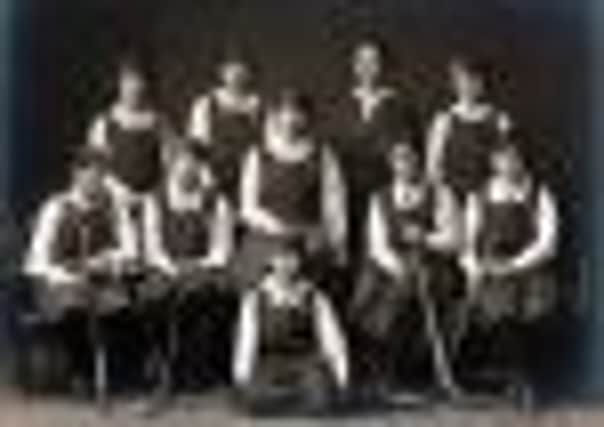Diary shows schoolgirl’s experience of war


In the safety and comfort of her city boarding school, 11-year-old Helen Lindsay had cold baths, the dread of exams and prefect duties to keep her life as normal as possible – as well as her diary.
“Last night war was declared between Germany and Great Britain,” she wrote on August 5, 1914. “We went along to see Territorials start on cycles to beyond Edinburgh. They got tremendous cheering.”
Advertisement
Hide AdAdvertisement
Hide AdAs a boarder at St George’s School for Girls, Helen would pore over her diary every day, recording the goings-on in her schoolgirl life, as well as those from across the world.
Now six of her treasured memoirs – which span the period 1913 to 1918 – have been unearthed at the Ravelston school and are being showcased as part of its centenary year of boarding in 2012.
“I think it shows that even at school they were aware of what was happening,” said librarian Nigel Shepley, who discovered the collection in the school’s archives. “On the other hand, it’s just a normal schoolgirl’s life and it strikes you as quite modern in some ways.”
It was almost a century ago that Helen, a dark-haired youngster who loved sport, dreaded Latin and would one day become the school’s head girl, began her schooling at St George’s. At 11-years old, she was the youngest boarder in 1912. Her diary notes her getting up at 7am, taking “a cold bath” before “breakfast at 7.45 and then school” (January 9, 1913) – typical entries for a pupil of the era.
But she also writes about the dark days when her brother Jack, a second lieutenant in the Black Watch, was reported “missing, presumed dead”, offering an insight into the torment suffered by families of serving soldiers during the Great War.
On November 23, 1916, just eight months after Jack arrived in France, Helen wrote: “Mother told me that Jack was wounded. The telegram came from the depot. But she telephoned later to say he was only very slightly wounded.”
She goes on to jot down the details of her brother’s “very nice” medal which arrived on February 17, 1917, before recording how her “daddy and mother extracted a piece of bomb half an inch long from Jack’s foot” in April 1917.
“He [Jack] had it since the 13th November,” she adds. “A bomb had burst a yard away. It gave him a slight wound and this piece in the heel, but it is a miracle he wasn’t killed.”
Advertisement
Hide AdAdvertisement
Hide AdHowever, Helen and her parents were plunged into turmoil when Jack was reported missing in March 1918.
“He may well be a prisoner, but we must wait for news,” Helen wrote on March 20, 1918.
The following month, Helen told how a “very nice” letter from a Captain McRosty had arrived, stating there had been a “terrific five-hour bombardment” before the Germans came over in their thousands. “Jack’s company was outflanked and no more was heard of anyone,” she added.
Finally, on April 12, 1918, Helen received the news she and her family had been praying for.
“A telegram came at eight o’clock: Jack Lindsay, prisoner, unwounded. Now the awful strain has been relieved and we are all so thankful. I feel I could sing and sing with joy.”
The exact details of Helen’s childhood are unknown, apart from that she was born in 1901 and that her father was a minister at St John’s Parish Church in Bathgate.
As an adult, she lived in East Lothian and her married name was Shepherd. Showing a lifetime commitment to the boarding school where she spent many years of her childhood – and where she became head girl and captain of the hockey team – she became president of St George’s Old Girls’ Association and it is thought she died when she was in her 90s.
Current teachers and pupils at the independent school saw Helen’s diaries for the first time a few weeks ago, when extracts were read by first year girls in assembly.
Advertisement
Hide AdAdvertisement
Hide Ad“Seeing the past through the eyes of a girl their own age has been an enlightening experience for our students,” said the school’s headteacher, Anne Everest.
“Helen’s despair – and then her relief – when she finds out her brother is a prisoner of war makes events from 100 years ago real and immediate for the whole school community, for she was one of us.”
From having a cold bath and knitting socks for the soldiers embroiled in the First World War, to learning Latin and being elected prefect, Helen’s diaries depict what everyday life was like at the school.
There is talk of playing cricket and making laughing gas in science, where she adds: “I felt quite cheerful all night, so perhaps it was the effect of that.”
However, the harrowing glimpses of war are clear, including the day her friend Ethel received word that her brother had been killed.
Helen also writes about other news in the Capital at the time, such as tram fares being raised by 50 per cent on New Year’s Day 1917, when “a fearful lot of people didn’t travel”, and the Ratho rail crash two days later, which killed 12 people.
Helen’s pocket-sized “Charles Letts’ School-Girls Diaries” also include printed information about verbs – Latin, French, Greek and German – as well as historical events, mathematical tables and science notes.
There is even a list of rulers of the world in each diary, including Emperor Franz Josef of Austria-Hungary and George V of the British Empire.
Advertisement
Hide AdAdvertisement
Hide AdMr Shepley added: “I think it’s interesting that schoolgirls were assumed to need to know such things then.”
n Did you know Helen Lindsay? Contact us at [email protected] or call on 0131-620 8734.